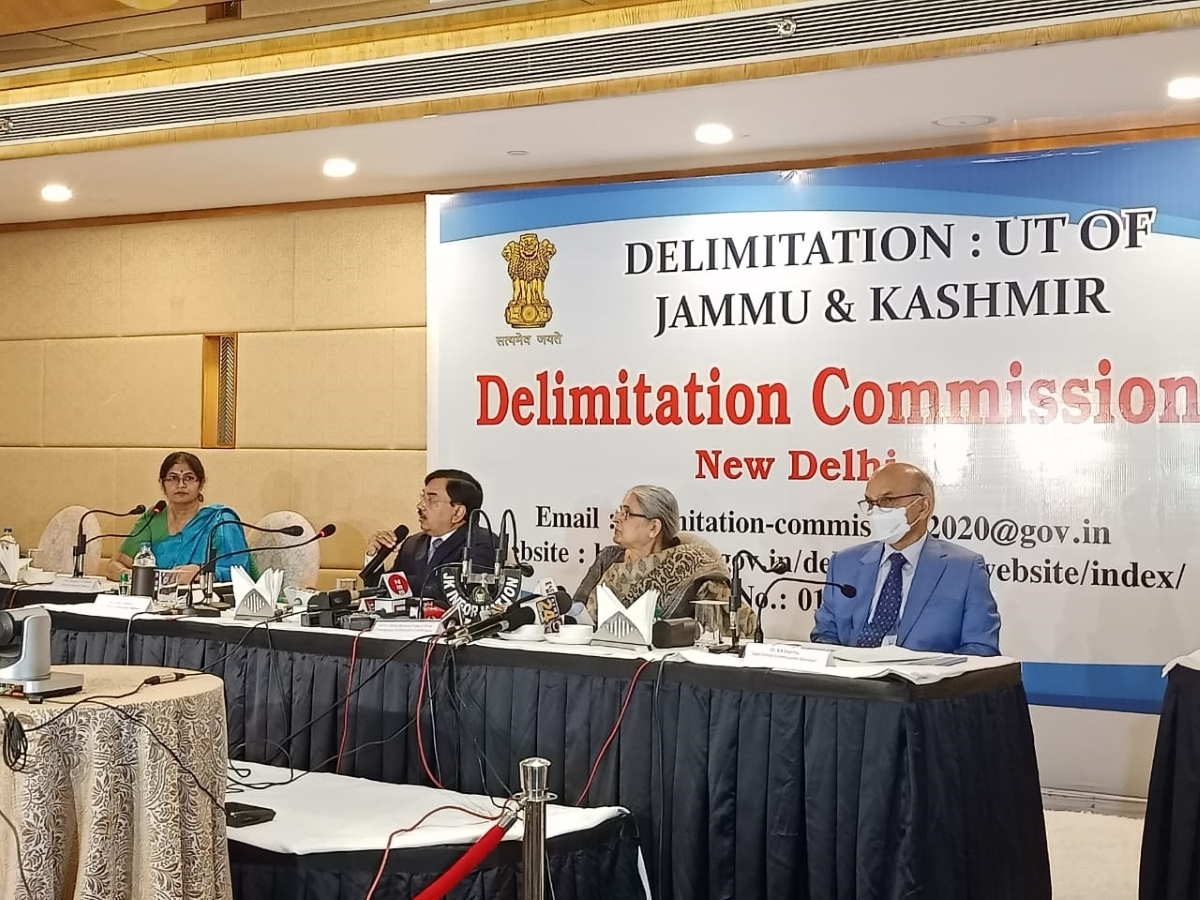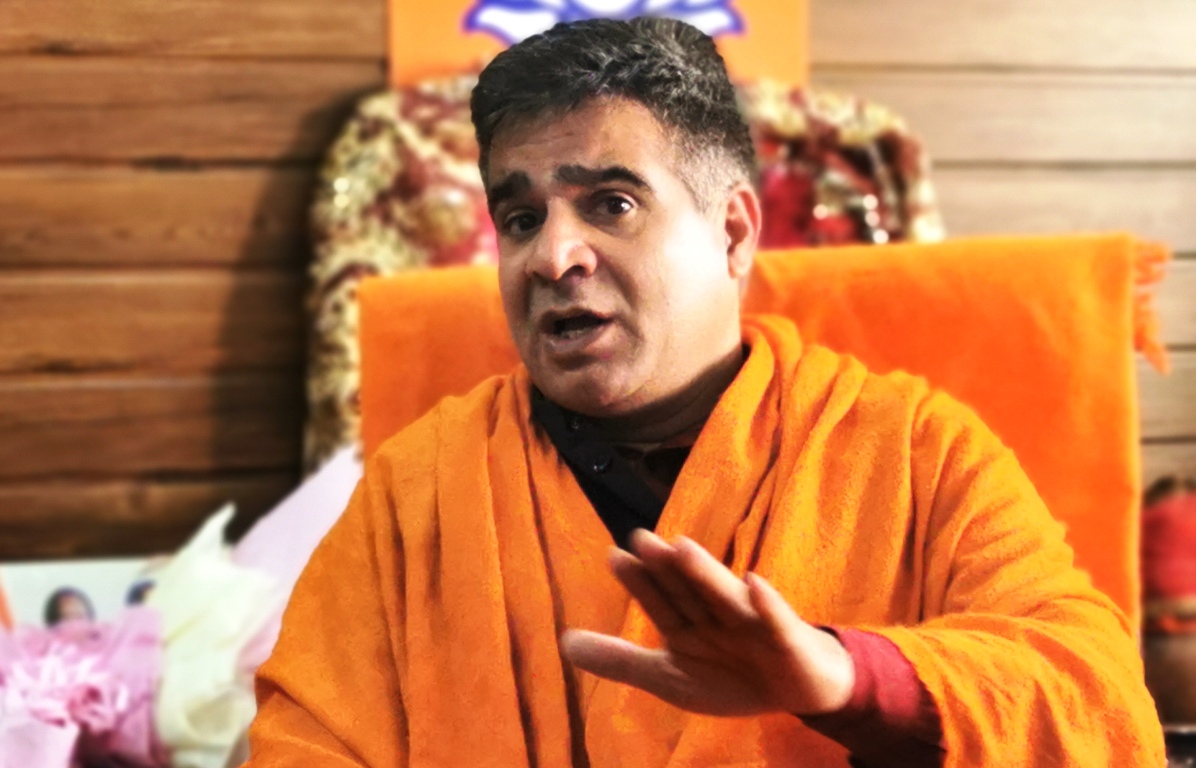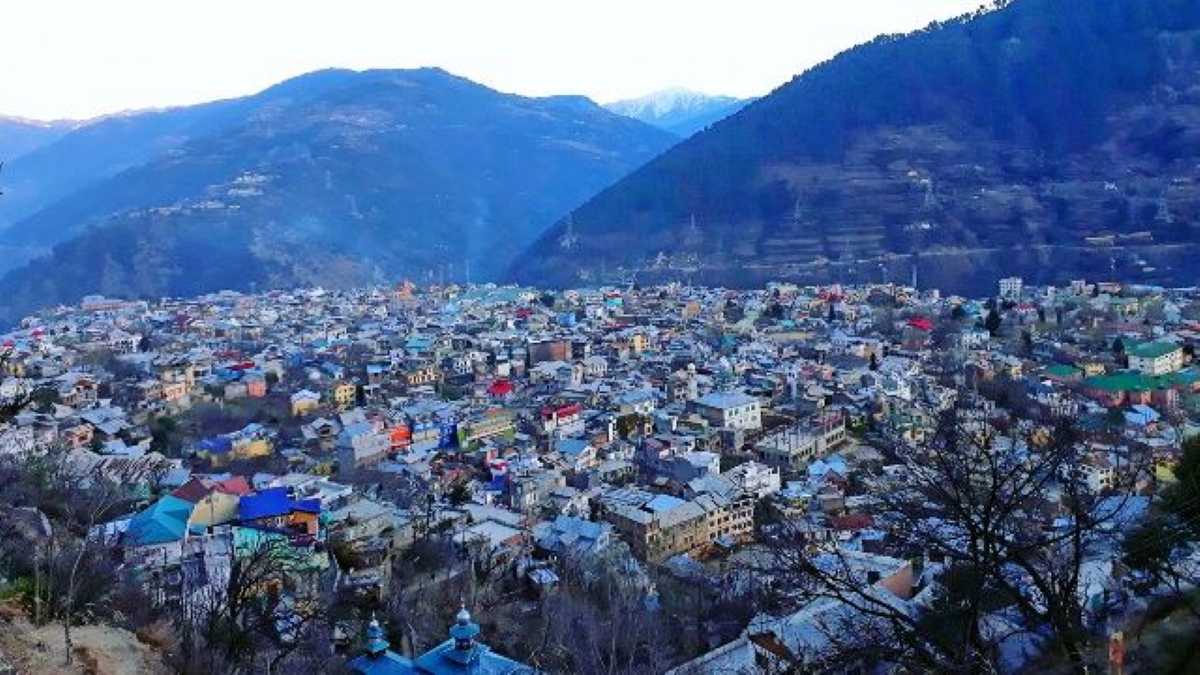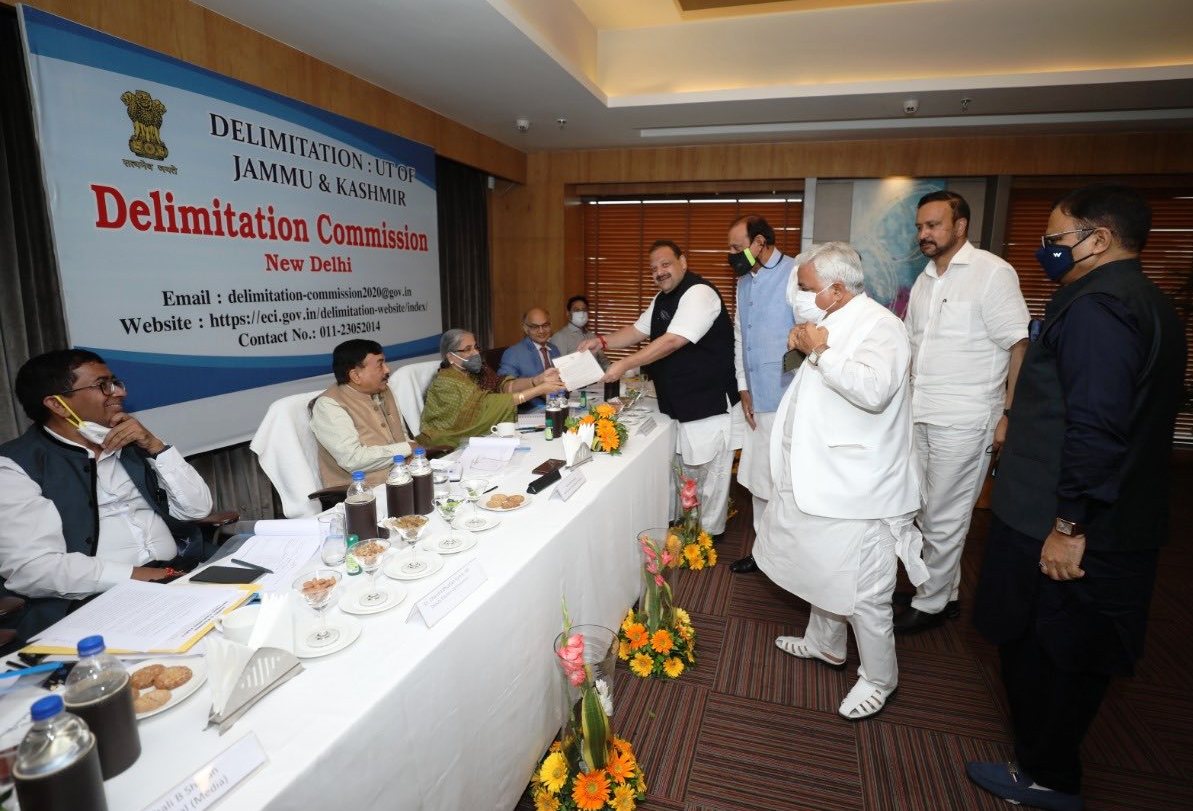After Prime Minister’s all-party meeting started re-engagement with condemned Kashmir parties, the 4-day visit by the 3-member Delimitation Commission tasked to add seven berths to a truncated assembly, witnessed political parties making their cases. With one prominent boycott, the multitude of suggestions before the Commission indicate as if Jammu and Kashmir is being pushed to the Praja Sabha days, reports Yawar Hussain

With the Delimitation Commission visiting Jammu and Kashmir the second time, the political parties barring the People’s Democratic Party (PDP) met the commission with the demands ranging from de-freezing of seats reserved for Pakistan Administered Kashmir (PAK) to a reservation on basis of caste, faith and ethnicity.
Unlike Jammu, the Kashmir region, where the population is higher, witnessed the invitee politicians being allotted around 20 minutes each for interaction at a five-star hotel. The security grid had blocked the entire road and converted the hotel into a sort of a fortress.
The ruling Bharatiya Janata Party (BJP) championed the Jammu cause. Kashmir centric parties including the five-member People’s Alliance for Gupkar Declaration constituents termed the exercise “unconstitutional” but four of them including the National Conference met the Commission.
BJP’s Objective
BJP President Ravinder Raina told Kashmir Life that they informed the Commission that the 1995 delimitation process favoured Kashmir.

“We told them there was an imbalance of power ever since then,” Raina said, adding that they demanded eight seats from the quota of 24 seats reserved for PaK. These can be given to internally displaced people.
Raina also told the Commission that population alone can’t be the criterion for delimitation of constituencies because in the rest of India the population is the sixth point while geography is a key element.
Similar voices were echoed by Jammu and Kashmir Sharnarthi Action Committee (JKSAC) and All J&K 1947 POJK Sharnarthi Intellectual Forum.
JKSAC President Gurdev Singh told the Commission that out of the existing 37 constituencies in the Jammu region, the DPs have concentrations in almost 18 constituencies. The DPs have a significant population particularly in three constituencies of the Jammu district namely Gandhi Nagar, R S Pura and Suchetgarh and two more constituencies can be carved out easily for DPs. He said regrouping of votes/areas can provide space for the representation of this abandoned section of society.
All J&K 1947 POJK Sharnarthi Intellectual Forum (SIF) submitted to the Commission that the population of Sharnathis has reached nearly ten lakhs and therefore they were deciding factors in several constituencies.
“Since 25 seats are kept reserved for the POJK Sharnarthis without any solid reasons and out of 25 seats one seat has already been de-freezed and rest of 24 seats are frozen whereas people who migrated from India to Pak in 1947 have got there due to share and are also enjoying their democratic rights,” the SIF said. “Out of 24 seats we deserve at least eight seats according to our population”, the Forum added.
ST Reservation
The reservation for the ST community was raised by and large by all the parties in Jammu as well as in Kashmir.
BJP’s Raina said he asked the Commission to reserve seats for SC and ST communities in Jammu and Kashmir as per their population.
Echoing similar demand, a BJP member from south Kashmir Showkat Shabir Choudhary said they told the Commission in Pahalgam that Dooru and Pahalgam seats should be reserved for STs while Qazigund should be carved out as a separate assembly segment.
“We also pitched for reservations for the ST community across Jammu and Kashmir. They have been ignored for the past 70 years. Delimitation should be fair on basis of geography,” Choudhary said. ST apart, BJP’s Altaf Thakur said they pitched for a reservation for Kashmiri Pandits.

A senior BJP leader wishing anonymity said they presented the blueprint of demands for reservation for the SC and ST communities under which at least 18 seats can be carved out for them. They told the commission that proportionate representation of SCs in the 90-member house works out to 6.64 seats as they constitute 7.38 per cent of the Jammu Kashmir population.
“As their share works out to 6.64 seats, they should get 7 seats as a fraction more than one-half is counted as one,” he quoted the BJP delegation as having told the Commission. The leader said the proportionate share of STs, who constitute 11.91 per cent of the population works out to 10.71 seats in the 90-member House.
The reservation demand for the STs was also raised by Gujjar-Bakerwal Ittihad Council (GBIC) leaders who met the commission at Pahalgam.
Choudhary Haroon Khatana, Chairman GBIC, told Kashmir Life that they have demanded political reservation for the ST community. “One seat for parliament should be for us in Kashmir from among the three. We also have demanded 20 seats for the ST community across Jammu and Kashmir,” he said.
Sikhs and Pandits Too
SC, ST apart, the reservation was sought on the basis of religion, almost a return to Praja Sabha days. All Parties Sikh Coordination Committee (APSCC) demanded five seats for the Sikhs with the three in the Jammu and two in Kashmir.

“We (Sikhs) have been denied representation in the legislature and it is due to this reason that the burning issues confronting the community have not been addressed so far,” Jagmohan Raina told the Commission.
The APSCC Chairman said that politicians at the centre as well as in Jammu and Kashmir have ditched them and as such, there is a trust deficit.
“We are living in a jungle without any political representation and a reservation for the community would go a long way in fulfilling the political aspirations of the community members,” said Raina. “Neither the erstwhile state government nor the central government has ever thought of giving political representation to Sikhs. So five seats; three in the Jammu division and two in Kashmir valley should be reserved for Sikhs.” Jagmohan said his community is scattered across 126 villages and population or area alone cannot be applied in delimitation.
Kashmiri Pandits also support communal representation. A delegation led by under Dr Ramesh Raina asked Commission to reserve five assembly segments.
Talking to Kashmir Life, Raina said they drew the Commission’s attention towards the Sangha Constituency of Sikkim, reserved for the monastic community, which has no boundaries. Besides, they also referred to the provision for the nomination of three seats by the Government of India to the Puducherry assembly.
“In Parliament also, the President can appoint 12 members to Rajya Sabha. These members enjoy the same voting rights as elected members, except that they can’t vote in the election of the President,” Raina said. “Until last year, the President could also appoint two members to Lok Sabha from the Anglo-Indian community. These members too had the right to vote on all matters, except the election of the President.”
However, Jammu and Kashmir Apni Party leader Rafi Ahmad Mir, who met the Commission in Srinagar and Pahalgam said they demanded that the migrant population including Pandits should be counted as voters in their original place of residence prior to migration.
BJP on the other hand has demanded the reservation of three seats for the Kashmiri Pandit community in Kashmir. “We demanded one seat each in north, central and south Kashmir for Kashmiri Pandit community,” Raina said.
Chenab Valley and Pir Panjal
Apni Party, which met the commission under Vice President Choudhary Zulfikar said that they informed the Commission that it was important to visit the far-flung areas viz Pirpanjal (Rajouri-Poonch), Ramban, Reasi, Ramnagar, Udhampur, Bani, Billawar and Basholi areas of Kathua District, and other remote areas of Kashmir.

They told the Commission to enhance the number of (seven) seats on the basis of population alone. “Seats should be provided to those districts which are underrepresented till now,” Zulfikar said. They sought a Parliamentary seat for the Pir Panjal region. “In Jammu-Poonch Parliamentary segment, Rajouri-Poonch has 10 lakh population (living in remote areas) and Jammu-Samba has 18.5 lakhs in comparison,”
Congressmen from the Chenab valley region met the commission in Kishtwar and pitched for the creation of new assembly segments including Padder and Dachan-Marwah besides Gool in Reasi.
Ghulam Mohammad Saroori told Kashmir Life that they demanded three more constituencies for the Chenab Valley, comprising the Doda-Kishtwar-Ramban belt, and stressed that “population as in plains should not determine new constituencies in uneven terrains”.
“Despite being bigger in area than Kashmir, the Chenab Valley has not got its due so far. We demanded three additional segments be carved out to declare Padder, Dachan-Marwah and Gool as new constituencies,” Saroori said. He told the Commission that Hindu pockets should not be separated from the Muslim areas. “The natural borders and not religious lines should be focussed on to create any new constituencies.”
If Gurez and Nubra, with a lesser population, can have assembly segment status, why Chenab valley areas can’t have the same right. “The area of our constituencies is 10 times bigger than the assembly segments of Jammu and Srinagar districts. Still, we get the same amount of funds. This is unfair,” he said.
Fudged Census?
BJP leader and former minister Sunil Sharma, who met the panel along with five other leaders from Chenab valley suggested that the fresh electoral rolls and not the 2011 Census should be the basis of delimitation.
“The 2011 Census was fudged. Earlier, constituencies were identified to please two families. Our suggestion is that the population should not be the sole criteria,” Sharma said. “The terrain, its vastness, accessibility and scattered population should be taken into consideration. The Chenab Valley should be seen as per the watershed of the river Chenab and accordingly, new constituencies should be identified.”
NC’s Double Standards
The National Conference in Srinagar told the Commission that population alone should be the criteria for deciding the boundaries of the new constituencies, its leadership in Jammu sided with the BJP’s view in the region which batted for the population to be just one parameter for the exercise and not the sole.

Its Jammu leader, Devender Singh Rana in his proposal stated: “Delimitation should be as per the constitutional framework based on the basic tenets of delimitation, population, geography, topography, area, physical features, contiguity, the convenience of administrative units and facilities of easy communication and approachability of public convenience.”
In Srinagar, the NC demanded the population should be the sole parameter to delineate constituencies and did not seek any reservation for SCs or STs. However, Rana, pointed out there were geographical and topographical challenges in the Jammu region and certain areas are far-flung, inaccessible, remote, backward and mountainous. “The SC and the ST must get adequate judicious representation. Reservation should be based on settled criteria, which should be followed in a transparent manner.”
Interestingly, the NC didn’t raise any specific demands for the Pir Panjal and Chenab valley areas except submitting a memorandum dictated by the party leadership.
The NC memorandums questioned the validity of the exercise terming it “unconstitutional” along with demanding statehood and subsequent elections.
Partiality Bogey
The Jammu and Kashmir National Panthers Party, which met the Commission at Jammu said that there should be 45 seats each for Jammu and Kashmir divisions. Harshdev Singh said that Jammu has been discriminated against even though its geographical area is nearly double of Kashmir valley. “Population alone cannot be a factor for keeping Jammu with fewer seats,” Singh said.
BJP’s Raina said Jammu has seen discrimination since 1947 by Congress, NC and the PDP.
Dogra Swabhiman Sanghatan led by former BJP leader Choudhary Lal Singh said that the present Commission is biased against Jammu because the central government doesn’t want the regional disparity to end. “If they would want Jammu to be empowered then they would have trifurcated the erstwhile state,” he said.
The 2011 Census
Census 2011 is the basic criterion for delimitation and the figures suggest
Jammu region is better placed than Kashmir. Of 1,22, 67,013 people counted, 68,88, 475 (56.15%) are in the Kashmir and 53,78, 538 (44.57%) in Jammu. Kashmir has 46 seats in the assembly (55.42%) and Jammu has 37 seats (44.57%). The average population per assembly segment in Kashmir is 1,49,749 and 1,45,365 in Jammu.
Muslim representation in the last assembly was 66.66 per cent against 68 per cent population. In comparison, Hindus’ forming 28.44 per cent of the population had 31 per cent representation.
PDP’s Boycott
Interestingly, the PDP, which has headed two governments in Jammu and Kashmir, distanced itself from the Commission citing the “unconstitutionality” of the Jammu and Kashmir Reorganization Act 2019 under which the exercise is being conducted. The decision followed the party’s participation in the all-party meeting that Prime Minister hosted.

“On August 5, 2019, the constitutional and democratic values of our country were trampled upon with people of J&K being robbed of their legitimate constitutional and democratic rights by means of abrogation of Article 370 and 35 (A) of the Indian constitution, illegally and unconstitutionally,” party General Secretary Ghulam Nabi Lone Hanjura wrote to Commission Chairperson Justice (Retd) Ranjana Prakash Desai. “The Reorganization Act is a product of the same process, we are of the considered opinion that the Delimitation Commission lacks constitutional and legal mandate in the first place and its very existence and objectives have left every ordinary resident of J&K with many questions.”
Lone said there are apprehensions that the delimitation exercise is part of the overall process of political disempowerment of the people of Jammu and Kashmir that the Centre has embarked on. “There are apprehensions that the process is aimed at realizing the political vision of a particular party in J&K wherein, like other things, the views and wishes of the people of J&K would be considered the least. It is a widespread belief that the contours and outcome of the exercise are pre-planned and the exercise is a mere formality. The very intent is under question,” he said, regretting that there was no follow up to the all-party meeting.
PDP’s decision received applause from the NC leader and former lawmaker Aga Syed Ruhullah Mehdi whose own party participated in the exercise.
“It is never too late to stand for your rights. Unambiguity is the way forward. Hoping this letter reflects the in-house consensus. The message of the letter is appreciable,” Mehdi, the erstwhile chief spokesman of NC, tweeted.
The boycott decision, Mehbooba Mufti said was responded by summoning of her mother by the Enforcement Directorate.
Silent Valley, Vocal Jammu
Even though the Jammu region is abuzz with political activity around delimitation, the mood in Kashmir was passive with hardly anybody talking about the process. The apprehensions on the delimitation process raised by politicians are not resonating in the attitude of the common Kashmiris, beyond a point.
“They (people) don’t think that they can be further disempowered while people in Jammu are actively involved because they see an opportunity to grab the upper hand,” a PDP leader said on basis of staying anonymous.
“They (the government) will do what they wish to and after August 2019 nothing matters actually,” a professor, talking anonymously, said. “By protesting or suggesting you will make their argument strong that the outcome (of delimitation) was participatory. So why get a new headache.”

Sajad Lone’s Peoples Conference while questioning the timing of the exercise said in his resolution, “The rumour mills are in fact in a heightened state of frenzy suggesting that the whole exercise is being carried out to disempower people of a particular region. Though PC does not believe in such unsubstantiated and hypothetical narratives and has full faith in this Constitutional body, yet the party feels that there should be abundant transparency, noticeable impartiality and perceptible fairness on the part of the Delimitation Commission as regards the processes, methodology and principles employed.”
The NC said: “The J&K Reorganization Act, 2019 is palpably unconstitutional. We have challenged the Act in the Supreme Court, which is before the constitutional bench. The two pillars of the State — Executive and Legislature — must out of respect to the third pillar, judiciary, avoid implementing and exercising powers under an Act that is under scrutiny.”
Commission’s Take
As the Commission concluded its 4-day visit, it said in a presser that the 24 constituencies reserved for the PaK will remain untouched.
The Commission, however, hinted at considering geography, topography and communication facilities along with population as the criteria to re-draw constituencies.
The Chief Election Commissioner Sushil Chandra, who is an ex-officio member of the Commission, said the exercise to re-draw boundaries of assembly constituencies is a “very complex issue and not a mere arithmetic.”
“We are quite happy to see great participation in the process. I would say that difficult terrain wasn’t acknowledged in the earlier delimitation done in 1995,” Chandra said. “The population has to be the main criteria for delimitation but priority will be also the area, geography, topography and also the communication facilities of the areas.”
The commission, however, said that the process will be completed in a very transparent manner and the draft prepared by it will be put in the public domain for objections and queries after which associate members of the commission will also be consulted for preparing the final draft.
The Commission said due representation to SC and ST will be given. “We will keep in mind the census of 2011. As per the delimitation act, we have to go by the latest census available.”















